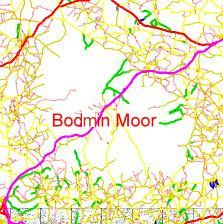RIDDEN ACCESS TO BODMIN MOOR - FURTHER INFORMATION AND BACKGROUND
Many areas of Bodmin Moor have always been traditionally and freely ridden and walked (De Facto Access). The CROW Act 2000 gave access by right to walkers.
The Association of Bodmin Moor Commons Landowners are wishing to manage ridden access by pemits.
A new "Interpretation Board" has been sited in the carpark at Roughtor. This was installed by Cornwall Council with their Logo, iIndicating that horses are banned unless by permit.
The Association of Bodmin Moor Commons Landowners have now assured the British Horse Society that a permit scheme is not currently in operation
The British Horse Society believes that riding should generally be free and available to all, as for walkers and cyclists.
Permit Rides or 'Toll Rides" may be appropriate in some circumstances but only where it is not possible to provide new free access for all riders and where there is no right of way, recorded or unrecorded.
Rights of Access to the Moor:
- There are very few recorded rights of way on Bodmin Moor either for walkers or riders. One or two bridleways do lead onto the moor.
- The CROW Act 2000 (Right to Roam Legislation) gave rights to walkers to access the Moor but not to riders.
- Walkers previously had regularly and freely used the moor as do riders (De Facto Access).
- Importantly the CROW Act does NOT take away any rights (recorded or unrecorded) for riders to access the Moor.
- The CROW Act does not prohibit riders from the moor in any way. Any prohibition is purely the prerogative of the landowners.
- Undoubtedly there are many paths and tracks on the moor that could be claimed as Rights of Way - this a possible avenue to go down.

Bridleways shown Green
The Effects of Licence or Permit Schemes
- All such schemes as the Forestry Commission licence and local "Toll Rides" impinge most greatly on the casual rider.
- A yearly permit can be a significanat sum for average horse owners who are not the wealthy indivuals that some think. Many have to scrimp and save to keep their horse.
- Casual visitors are worst affected. The Forestry Commission cannot offer day licences because it can't administer them. Evidence seems to suggest that many riders ignore the forectry permits.
Wider Implications:
- Walkers have loads of footpaths loads of Open Access and all for free. Riders are very limited where they can go but are now are to possibly to be penalised even further. Riding used to be the way of travelling everywhere
- The East of the County has very few bridleways and riders rely on the open spaces and green lanes where available for their riding.
- On Dartmoor riders have a legal right to ride (National Parks Act)..
- Our definitive bridleway network is totally incomplete and fragmented. Around 50% of what we ride is open spaces or undesignated tracks or connecting links.
De Facto Access
De facto access was described in the Government's
consultation paper on access to the open countryside (1998) as "access
over land tolerated by [the] owner, particularly in upland areas and on
commons. Such access is often founded in long-standing traditions."The essential elements of de facto access are the absence of any legal
right to be present on the land, and the toleration or implied consent
of the owner to the recreational user's presence.
Bodmin Commons Bill in 1996.
An interesting insight into access on the moor can
be found in Hansard at the second reading of the Bodmin Commons Bill in
1996. See Extracts
Public Access was wanted by many to be included in the Bill including horse riding, but the clause relating to public access was withdrawn subject to debate and apparent safeguards.The situation on Bodmin Moor was compared to Dartmoor National park, every walker has a statutory right to walk and every rider to ride across the moor. It was therefore argued that was why access should be included but the argument failed.
The Bill
was a private Bill, promoted by Cornwall County Council, to deal with a
specific difficulty. The promoters felt that it was not appropriate to
encompass the wider national question of access.
De Facto Access on many parts of the Moor were acknowledged.
The BHS and Riding Establishment were "petitioners" asking for horse access to be included. Extracts from the Debate
Eventually petitions against the Bill lodged by the British
Horse Society and the owners of a riding establishment on the edge of
the moor were withdrawn because they accepted that the promoters
(Cornwall County Council) met their concerns.
It was specifically emphasised, however, that nothing in the Bill altered the availability of public access to the commons (ie existing De Facto Access.)
Subsequently however Rights for Walkers only were given under the CROW Act 2000.